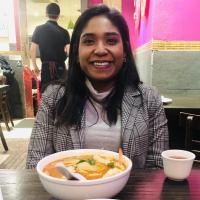Students
PhD Student Profiles
Anthropology
Aarushi Shah
Track: Anthropology
Cohort Year: 2021
Areas of Interest: Medical and Feminist Anthropology, Maternal and Reproductive Health and Rights, Trauma and Resilience, Sexual and Gender-Based Violence, Subaltern Studies (in South Asia), Gender and Health Equity
Education: BA, Anthropology, Harvard College (2021)
Aarushi Shah became passionate about the intersection of anthropology and public health as an undergraduate student at Harvard College, where she trained as a qualitative researcher on a project examining the lived experiences, help-seeking behaviors, and support needs of women survivors of intimate partner violence. As a fellow in the NIH Predoctoral Training Program in Gender, Sexuality, and Health (GSH) at Columbia University, Shah plans to continue exploring questions at the intersection of violence, maternal, and reproductive health, mental health, and health systems through ethnographic and mixed methods research. Shah's current research involves exploring how male perpetrators of intimate partner violence in Goa, India navigate and embody ideals of hegemonic masculinity and paternalism based in the larger political economies, histories, and socio-religious traditions of post-colonial India. Ultimately, Shah aspires to conduct public health research that amplifies the voices of marginalized populations and develop scalable, culturally sensitive interventions in collaboration with affected communities.
![]()
Betselot Wondimu
Track: Anthropology
Cohort Year: 2021
Areas of Interest: Structural Violence & Social Suffering, Embodiment, Cultural & Social Constructions of Mental Health, Race, Ethnicity & Immigration, Mixed Methods Research, Prevention Science, Harm Reduction, Health & Social Policy
Education: BS, Public Health Science, University of Maryland, College Park (2019); BS, Anthropology, University of Maryland, College Park (2019)
Betselot Wondimu is interested in examining the etiology of mental distress and foregone mental health care in black and immigrant populations. Wondimu hopes to explore conceptions of embodiment, resilience, and enculturation which are interrelated with race- and assimilative- based stress, and examine how they intersect with social marginalization. Through mixed methods research, Wondimu aims to improve communication around mental health and coping strategies in cross-cultural contexts; inform the decisions of policymakers and institutional stakeholders; and redistribute educational and clinical resources to populations that have been historically excluded from access. Prior to his doctoral studies, Wondimu worked as a Public Health Analyst at RTI International's Center for Behavioral Health Epidemiology, Implementation, and Evaluation.

Tasfia Rahman
Track: Anthropology
Cohort Year: 2020
Areas of Interest: Medical Anthropology, Mental Health, Gender, Immigration, Race & Ethnicity,Asian American Health, Bangladeshi Diaspora, Social & Health Inequalities, Culturally Competent Care, Ethnographic Methods, Community-Based Participatory Research
Education: MA in Social Sciences (Anthropology), University of Chicago; BA in Anthropology, Medieval Studies, and Classics (Latin), SUNY Binghamton
Tasfia Rahman’s research focuses on understanding why there are gendered trends toward suicide, suicide ideation, and depression among Bangladeshi immigrant women in New York City. She is particularly interested in how broader social trends such as immigration, migration, colonization, and globalization can elucidate these trends often coded as mental conditions. Through her Master’s thesis research, she learned more about help-seeking thoughts and behaviors among Bangladeshi-American second-generation women regarding mental health and identified barriers in accessing culturally competent care. Before beginning her doctoral studies, Rahman worked for a pan-Asian policy advocacy organization, Coalition for Asian American Children & Families (CACF), where she collaborated with NYC-based Asian-led and serving community-based organizations, community members, local government, and researchers to address systemic inequities in health, education, and language access.
As an incoming fellow in the NIH Predoctoral Training Program in Gender, Sexuality, and Health (GSH) at Columbia University, Rahman further seeks to study the challenges Bangladeshi immigrant women face in the American healthcare system and develop more effective culturally competent care models through the use of ethnographic and community-based participatory research methods.

Alyssa Basmajian
Track: Anthropology
Cohort Year: 2018
Areas of Interest: Medical Anthropology, Gender and Sexuality, Reproductive Health, Embodiment, Ethnographic Methods, Social Movements in the United States, Health Advocacy
Education: MA, Cultural Anthropology, City University of New York Hunter College (2014), BA, Cultural Anthropology, City University of New York Hunter College (2014)
Alyssa Basmajian’s research interests are grounded in the political and social tensions surrounding reproductive health in the United States. For Basmajian’s master’s thesis research, she examined a new form of political expression known as the abortion or full-spectrum doula by drawing on theories of embodiment and social transformation. In her current role, as fellow in the NIH Predoctoral Training Program in Gender, Sexuality, and Health (GSH) at Columbia University, Basmajian plans to further investigate doulas and the care they provide in the Southern United States. Most recently, Basmajian has received the National Science Foundation Graduate Research Fellowship (NSF-GRF) to further support her research. Prior to beginning her doctoral studies, Basmajian was the health educator at NYU Fertility Center and also volunteered for ATHENA Network, a nonprofit organization that aims to advance human rights and gender equity in the global response to HIV.

History
Valentina Parisi
Track: History
Cohort Year: 2018
Area of interest: History of Public Health, Environmental History, Environmental Health and Policy, Global Pandemic Preparedness and Response, Public Health Ethics
Education: MPH, Mailman School of Public Health, Columbia University (2017), MS, Integrative Studies, Brown University (2015), BA, Anthropology, Brown University (2014)
Prior to Columbia, Valentina studied anthropology and immunobiology at Brown University where she received her MS and BA degrees. While at Brown, she worked in the RI Hospital Surgical Research Department studying the immune response to fungal pathogens. This research experience and her continued interest in medical anthropology led her to the field of public health. She graduated from Mailman with her MPH degree in Sociomedicdal Sciences and a certificate in health and human rights in 2017. She became interested in historical methods and the intersection of health and the environment during her time at Mailman and following her MPH, she worked as a Program Officer in the Population and Family Health Department where she engaged in collaborative research projects concerning environmental and gender justice and forced migration and health.
Valentina rejoined Sociomedical Sciences in 2018. Her doctoral research interests include the history of domestic environmental law and policy; shifting domestic environmental risk perceptions and responses during the twentieth century; and health social movements related to the environmental threats, such as toxic exposures. She is currently engaged in primary research on the conceptualization and management of epidemic- and pandemic-prone diseases and pressing social and enironmental problems during the twentieth century.
![]()
Sara Jane Samuel
Track: History
Cohort Year: 2018
Areas of interest: History of Public Health • Vaccination Policy • American Foreign Policy • South Asia • Public Health Ethics • Health Law & Policy
Education: MPH, Sociomedical Sciences, Mailman School of Public Health, Columbia University (2018); Bachelor of Arts, History of Science/History of Medicine, Yale University (2015)
Sara Jane Samuel developed an interest in the history, politics, and ethics of public health as an undergraduate at Yale University, where she wrote her senior thesis on the moral and methodological underpinnings of family planning programs in South Asia during the Cold War. As a student at the Center for the History and Ethics of Public Health at Columbia, she is interested in the intersection of public health with American foreign policy in South Asia. Specifically, Samuel is interested in examining the historical roots and consequences of coercive vaccination campaigns on the Subcontinent after World War II. Prior to her doctoral studies, Samuel worked in central California to increase access to prenatal healthcare to migrant workers and also has professional experience working to reduce sexual misconduct and promote sexual health on college campuses.

Sadie Bergen
Track: History
Cohort Year: 2017
Areas of interest: History of Public Health, Women's and Gender History, Environmental History, Public Health Ethics, Environmental Health, Reproductive Health
Education: BA, History, University of Chicago (2015)
Bergen developed an interest in the historical roots of the birth control movement in the United States as a history major at the University of Chicago, where she wrote her thesis on Progressive Era women reformers who framed family planning as public health project. As a student at the Center for the History and Ethics of Public Health, she plans to study the historical intersections between environmental and reproductive health and the gendered impact of American environmental policies, with the goal of contributing to research and policies that address reproductive health disparities. Before beginning her PhD studies, she worked in the publications department of the American Historical Association, where she learned to think about the work of history as a force for the public good.

Kristen Meister
Track: History
Cohort Year: 2016
Areas of interest: History of public health and medicine, History of disability, Health policy and politics, Disability and chronic disease, Social determinants of health, Food Policy and Nutrition, Data collection and surveillance, Public health ethics
Education: MPH, Columbia University (2016), BA, University of California-Berkeley (2011)
Kristen Meister’s interest in the social history of medicine and public health began while she was as an undergraduate history student at the University of California-Berkeley, where her research explored health reform during the Progressive Era. Meister pursued this interest further as an M.P.H. student in the Department of Sociomedical Sciences, conducting research on the relationship between policy, social thought, and the lived experience of disease and disability. Building on her previous professional experience in health promotion and health technology, Meister conducted research on the use of big data in public health surveillance for the Center for the History and Ethics of Public Health and the World Health Organization, and she became interested in the role of new technologies in public health practice. As a doctoral student, Kristen’s work integrates history, disability studies, and sociology to study public health, biomedical, technological, and political approaches to the prevention, management, and elimination of disease and disability. Through her work, Meister seeks to bring disability theory into public health research and practice. She plans to one day launch a center for disability research.
![]()
Laura Tracy Foote ("Tracy")
Track: History
Cohort Year: 2015
Areas of interest: History of public health and medicine, History of genetics and genomics, History of data science, Health inequality, Health policy and politics, Public health ethics, Middle East and North Africa
Education: MPH, Epidemiology, Global Health, Mailman School of Public Health, Columbia University (2015); BA, History, Williams College (2007)
Tracy Foote’s interest in the social history of medicine and public health began while she was an undergraduate history student at Williams College writing a senior thesis on “The Decline of Health and Health Services in Iraq from 1968-2003”, for which she was awarded highest honors. After college, Ms. Foote attended medical school at Northwestern University before ultimately leaving to pursue a career in public health. Ms. Foote received a MPH in Epidemiology with a certificate in Global Health. As part of her degree, she spent a semester+ working in Amman, Jordan at the Royal Health Awareness Society helping to design research on non-communicable diseases and grant writing. Ms. Foote then decided to re-focus on her interests in the history of medicine and public health with a PhD in Sociomedical Sciences, History Track. Her research interests focus generally upon health inequality at a system level and more specifically, on the intersection of the history of genetics/genomics and of Big Data and Open Access Science. Ms. Foote’s dissertation research focuses on the All Of Us Research Project, a NIH prospective cohort study recruiting one million people to share genomic, lifestyle, and environmental data to build a diverse health database.

Ian Bradley-Perrin
Track: History
Cohort Year: 2015
Areas of interest: HIV/AIDS • Social Policy • Social Movements • Law and Ethics • Gender and Sexuality • Consumer Politics • Citizenship and RightsEducation: MPhil, Sociomedical Sciences, Columbia University (2019); MA, History, Concordia University (2015); BA, History, Concordia University (2012)
Ian Bradley-Perrin’s research interest lies at the nexus of social movements, public health, law and policy. His focussing on the historical transformations seen in these areas through the first two decades of the AIDS crisis. With a background in historical research and oral history practice, as well as advocacy and activism in Canada and the United States, Bradley-Perrin has spent his time at the Mailman School of Public Health developing his understanding of the history of Public Health Ethics under Dr. Ronald Bayer and social movements and social policy change with Dr. Constance Nathanson. Bradley-Perrin’s dissertation investigates the social forces and historical context in which the Ryan White CARE Act was developed, passed and funded in the early 1990s and the impact that the new funding regime had on HIV/AIDS advocacy, health care delivery and treatment development, as well the transformations it made in broader field of Public Health.

Sociology
Alicia Jen
Track: Sociology
Cohort Year: 2022
Areas of interest: Asian American and Immigrant Health • Socialization • Structural and Interpersonal Racism • Adolescent and Young Adult Health • Sexual and Reproductive Health • Intimate Partner Volence Prevention
Education: MPH, University of Pennsylvania (2021); BA, Health & Societies, University of Pennsylvania (2019)
Alicia Jen (She/her) is interested in studying how family upbringing, acculturation, and racialization influence the formation of health beliefs and behavior, particularly among second-generation children of immigrants and Asian Americans. Jen is a GSH (Gender, Sexuality, and Health) Fellow and plans to focus her PhD research on intimate relationships and related health risks. Prior to joining the program, Jen worked as a research coordinator in a family planning clinic, conducting studies on topics such as contraception, STI prevention, and pregnancy care. Jen also has experience working on education and program evaluation in the realm of intimate partner violence prevention, including an MPH thesis that assessed attitudes towards online campus IPV resources during the COVID-19 pandemic through student focus groups. As an undergraduate, Jen participated extensively in Asian American student advocacy groups and hopes to continue that involvement in the New York City community.

Milan Riddick
Track: Sociology
Cohort Year: 2022
Areas of interest: Health Behavior • Racism and Health • Intersectionality • Health Equity • Social Determinants of Health • Medical Sociology • community-based Participatory Research
Education: BS, Biomedical Engineering, GeorgiaInstitute of Technology (2021)
Milan Riddick became interested in public health and health behavior research while studying as an undergraduate at Georgeia Tech. During that time she conducted independent, qualitative research to identify sources of trust and mistrust in the COVID-19 vaccine among Black citizens of Georgia. This work, in combination with Milan's efforts as a student advocate for racial and ethnic minority students, reaffirmed her dedication to addressing what she believes to be one of the greatest public health challenges our country faces: racism. At Columbia, Milan plans to examine intersectionality and investigate how experiences of racism in combination with other forms of interpersonal discrimmination impact medical mistrust and health behavior in Black communities. As a doctoral student, Milan's research will be supported by the NIH T-32 training grant in Gender, Sexuality, and Health.
Priort to attending Columbia, Milan worked in conjunction with the Fulton Country Board of Health to provide COVID-19 relief to its residents. Milan's educational background also has roots in bioengineering, drug design and delivery, and medical sociology. Milan's interdisciplinary background aids in her approach to addressing critical public health issues that impact her own community.

Ruth Shefner
Track: Sociology
Cohort Year: 2020
Areas of interest: Criminal Legal Systems • Substance Use & Overdose Prevention • Policing, Law & Social Policy • Collateral Consequences of Mass Incarceration • Social Determinants of Health
Education: MPH, University of Pennsylvania (2018); MSW, University of Pennsylvania (2017); BA, Community Health, Brown University (2013)
Ruth Shefner became interested in public health and mass incarceration as an undergraduate community health student at Brown University, where she worked with the Center for Prisoner Health and Human Rights on a series of projects related to harm reduction and criminal justice policy in Rhode Island. As a doctoral student in the HIV, Substance Use, and Criminal Justice Systems fellowship, Ruth hopes to investigate opportunities to apply harm reduction principles to criminal legal systems, as well as evaluate the impacts of current criminal justice reform policies. Prior to coming to Columbia, Ruth spent two years as a Health Research Analyst at IMPAQ International in Washington, DC, working with Centers for Medicaid and Medicare Services (CMS) on a variety of quantitative and qualitative support projects. She completed her MSW and MPH at the University of Pennsylvania, where she spearheaded research related to opioid overdose and criminal justice contact, supported the evaluation of Philadelphia’s prearrest diversion program pilot initiative, and worked as a case manager for Penn’s Goldring Reentry Initiative (GRI), supporting individuals pre- and post-release from Philadelphia’s county jail system. Ruth also spent two years as the Director of the GRI, where she oversaw all program operations, including client selection, collaboration of community and legal partners, clinical supervision of social work students, and program evaluation.

Alexander Borsa
Track: Sociology
Cohort Year: 2019
Areas of interest: Sexual Health, HIV, PrEP, Financialization, Stigma, Feminist Science Studies, Medical Sociology
Education: BA, Molecular Biophysics & Biochemistry and Women's, Gender, & Sexuality Studies, Yale University (2016)
Alexander Borsa studies sexual and reproductive health, with a focus on how processes such as financialization and geneticization shape identity and outcomes. His most recent publications trace the rapid influx of private equity investment in fertility and women's health services throughout the United States. Borsa is currently a member of the Harvard GenderSci Lab and the HIV Planning Group at the NYC Department of Health and Mental Hygiene. His research has been supported by the NIH T-32 training grant in Gender, Sexuality, and Health, as well as a Graduate Research Fellowship from the National Science Foundation.
![]()
Sonia Mendoza-Grey
Track: Sociology
Cohort Year: 2016
Areas of interest: Latino Health, Clinical Cultures, Science Technology Studies, Qualitative Methods, Social Determinants of Health, Epistemology
Education: MPhil, Sociomedical Sciences, Columbia University (2019); MA, Sociology, Columbia University (2012); BA, Human Biology, Stanford University (2010)
Sonia Mendoza-Grey became interested in ethnographic research and Latino health as an undergraduate at Stanford where she conducted qualitative interviews with Latinos who were part of community-based health intervention studies. As an MA sociology student at Columbia, she continued to pursue her interest in the social determinants of health for minorities. Her MA thesis analyzed the role of social networks and social cohesion in relation to obesity rates and health measures within sub-ethnic enclaves of Latino communities in the United States. Her publications to date, which explore racialized medicine and addiction treatment, are informed by her work on a NIDA-funded study at NYU Medical Center and her interests in mental health and stigma. Current major areas of focus include structural influences on health and qualitative research methods. As a doctoral student, Mendoza-Grey uses ethnographic research methods and science technology study (STS) frameworks to analyze clinical cultures, the production of medical knowledge, and biomedical initiatives in ethnic minority communities.
![]()
Hawi Teizazu
Track: Sociology
Cohort Year: 2017
Areas of interest: Health Equity, Health Policy, Public Opinion, Communication & Media, Resilience, Social Determinants of Health, Structual Racism, Reproductive Health
Education: BS, Biology, University of Minnesota (2015); MA, Sociomedical Sciences, Columbia University (2019), MPhil, Sociomedical Sciences, Columbia University (2021)
Hawi Teizazu is interested in bridging the gap between health research and health policy by examining the translation of health information in media, and experimentally testing the effects of media messages on public opinion and public policy attitudes. Her recent research examines message framing related to HIV, maternal mortality, and racial health disparities, and studies the implementation of culturally-informed health promotion initiatives in underserved communities. Her work also examined health policy as a force for health equity, and uses qualitative interviews and survey data to better understand the experiences of underserved groups within the healthcare delivery system and guide system interventions.
Teizazu is a recipent of the Robert Wood Johnson Foundation's Health Policy Research Scholars fellowship and is a predoctoral fellow in the Demographic and Behavioral Sciences Branch of the National Institute of Child Health and Development. Prior to joining Mailman, Teizazu worked in the Centers for Disease Control and Prevention and the Program for Health Disparities Research at the University of Minnesota where she strategized and evaluated programs related to chronic disease, maternal health, substance misuse disorders, and vaccine hesitancy.

DrPH Student Profiles
Anubhuti (Anu) Poudyal
Areas of Interest: Global Mental Health, HIV and Mental Health, Digital Health, Social Network Analysis, Gender and Mental Health
Education: Master of Public Health, Health Promotion and Community Health Sciences, Texas A&M School of Public Health (2018)
Cohort: 2021
Anubhuti (Anu) Poudyal is a doctoral (DrPH) student in the Sociomedical Sciences Department. She is a trainee in T32 Fellowship on Social Determinants of HIV. Her background is in global mental health, with a focus on the delivery of evidence- based, technology-driven interventions in low- and middle-income countries. She is primarily interested in understanding social and cultural factors influencing comorbidites such as HIV and mental health. As a T32 fellow, she intends to explore social determinants of HIV that influence treatment outcomes and medication adherence among vulnerable populations with comorbidities. During her doctoral program, Poudyal also wants to learn social network analysis to understand social structures and support systems that can positively influence health outcomes in low-resource settings. Before joining Columbia, she worked at the Division of Global Mental Health, George Washington University as a Senior Research Associate.

Tara McCrimmon
Areas of Interest: HIV/AIDS, Substance use disorders, Eastern Europe & Central Asia, Health & social policy, Structural interventions, Implementation research
Education: MPH/MIA, Mailman School of Public Health and the School of International and Public Affairs, Columbia University (2014), BA, University of Chicago (2007)
Cohort Year: 2020
Tara is a doctoral student (DrPH) in the Sociomedical Sciences Department and a trainee in the T32 Fellowship on HIV and Substance Use in the Criminal Justice System. She is interested in structural factors that impact access to and uptake of health/social services among key populations in the U.S. and internationally. Previously, she worked as a project director for the Global Health Research Center of Central Asia at Columbia’s School of Social Work, where she managed two HIV prevention and treatment intervention trials based in Almaty, Kazakhstan.

Lauren Broussard
Areas of Interest: Sexual health, Reproductive justice, HIV/AIDS, Intersectionality, Race and health, Social determinants of health, Racism, Public health history, Public health policy, Harm reduction, Sex work
Education: MPH, Tulane University (2007), MSW, Tulane University (2006), BS, Psychology, James Madison University (2005)
Cohort Year: 2015
Lauren Broussard is a Doctor of Public Health (DrPH) student in the Department of Sociomedical Sciences. She returned to school for doctoral-level training after gaining substantial professional experience in the federal government, with leadership positions addressing racial disparities in the domestic HIV epidemic, and she plans to continue this work during the doctoral program. Specifically, Broussard will focus on the use of intersectional approaches to explore how sexual and reproductive health outcomes among women of color are shaped by structural forms of gender and race-based discrimination. She is interested in increasing the utilization of quantitative research methods to explore these issues from a societal or population-level perspective.

Tracy Pugh
Areas of Interest: Social determinants of health, Health and social policy, Social justice and inequalities, Structural racism, Stigma, Punishment, Mass incarceration, Drug policy, Resilience, Vulnerable populations
Education: MHS, Health Policy, Johns Hopkins Bloomberg School of Public Health, BA, Sociology, Cornell University
Cohort Year: 2014
Broadly, Pugh is interested in understanding the intersections of policy, punishment, and stigma. Prior to Columbia, she worked to advance a public health approach to drug policy for New York at the Drug Policy Alliance and, before that, at the New York Academy of Medicine. She has extensive experience engaging in policy research and advocacy related to health disparities and social justice in partnership with nonprofits, government agencies, community stakeholders, advocates, and policymakers. She is a recipient of the Initiative to Maximize Diversity institutional training grant.




















